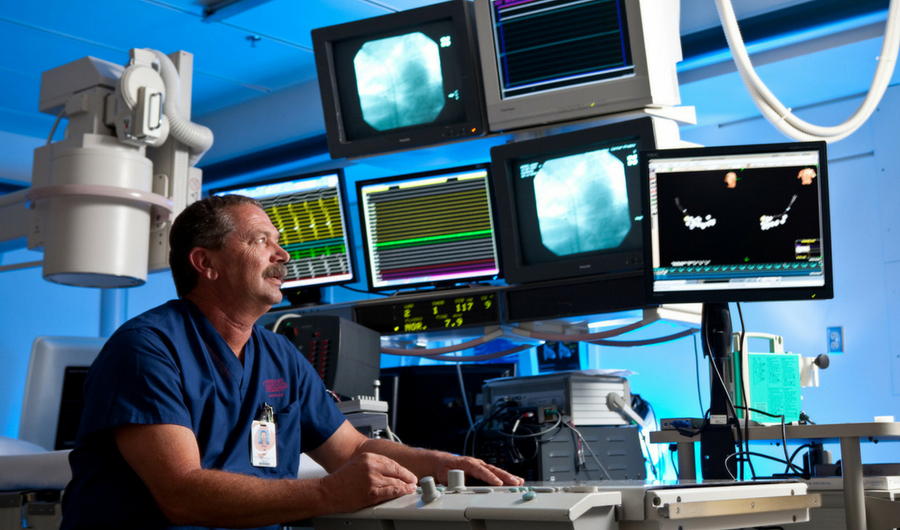After more than a year of studying the safety and effectiveness of elective angioplasties in hospitals without open heart surgery, Clovis Community Medical Center is seeing some amazing and comforting results.
 |
| Clovis Community's cath lab staff is participating in a state study on the effectiveness and safety of elective angioplasties in facilities without open heart surgery on site. The hospital was one of six hospitals chosen for the pilot project. |
Among six hospitals statewide chosen for the pilot study, Clovis Community is the only hospital with no deaths to report during the first year. While the study so far has shown there is no increased risk or real difference between hospitals with onsite cardiac surgery, other hospitals in the study did have to send some patients out for emergency surgery.
Cardiologists say this study is long overdue and is really about accessibility and convenience for patients and for doctors.
Currently state law requires hospitals to have cardiac surgery on site whenever patients undergo a non-emergency procedure to insert stents or balloons to open coronary arteries. The pilot project – officially called the Elective Percutaneous Coronary Intervention (PCI) Pilot Program and overseen by the California Department of Public Health – is a precursor to changing that restriction.
“There’s really been a push to let hospitals like Clovis which has an emergency room and an ICU and have been doing emergency stents for 20-some years without a surgeon, to go ahead do the elective angiogram cases,” said Dr. Rohit Sundrani, the lead cardiologist for the Clovis pilot project.
 |
| Cardiologist Rohit Sundrani removes air from a stent before inserting it into a blocked artery. |
Dr. Sundrani performed the first angioplasty at the hospital for the three-year study which began in August 2010. In the months since then, Clovis Community has a 93.8% success rate – the highest among the pilot hospitals – in fixing blocked arteries and returning the normal blood flow to the heart.
“Our outcomes have been even better than expected,” said Bob Forey, manager of the hospital’s cath lab. He attributes such success to the rigorous screening criteria for physicians and the staff’s experience. “Only experienced cardiologists with good outcomes are allowed to participate in the study. We also have the latest equipment and supplies available for the physicians to diagnose and treat patients who meet the study’s criteria.”
Forey is especially pleased by the average time of 65 minutes from the time a patient walks into the hospital to the time a balloon is inserted to remove blockages. That’s nearly 30 minutes under the nationally accepted goal of 90 minutes, and in line with other pilot study hospitals.
“Our patients tend to be walk-ins, while the five other pilot hospitals and most of those nationally who report ‘door-to-balloon’ times receive their patients via ambulance,” explained Forey. “This means those hospitals are usually informed by the ambulance crew 20 minutes before the patient arrives at the hospital. This allows them that time to call in the cath lab crew and prepare for the patients’ arrival.”
Clovis Community has always been able to do angioplasties on patients who come in through the emergency room exhibiting symptoms of a heart attack, said Forey. But those without emergency situations had to be transferred to another hospital to remove the blockage. “That’s been an added expense for an ambulance and more time before the blockage can be removed and often an extra day in the hospital … it’s much more convenient for the patient to have this done at the facility they came to,” Forey said.
Erin Kennedy reported this story. She can be reached at MedWatchToday@CommunityMedical.org.



